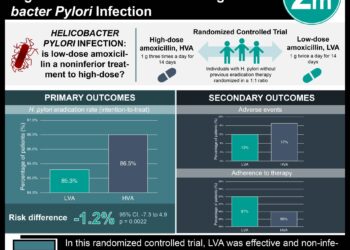Amoxicillin for the treatment of pneumonia with tachypnea in low resource settings
1. In this noninferiority study, children who received placebo for pneumonia with tachypnea had a higher incidence of treatment failure compared to those who received amoxicillin.
2. Numerically, more relapses occurred in the amoxicillin control group, but the between-group difference was not statistically significant.
Evidence Rating Level: 1 (Excellent)
Study Rundown: The epidemiologic profile of pneumonia has evolved over time due to mass vaccination campaigns against common bacterial pathogens. Today, viral agents are responsible for the majority of lower respiratory infections, yet antibiotics continue to be heavily relied upon, contributing to antimicrobial resistance and potential immunity. Further, recent trial data have suggested that withholding antibiotics may not have a significant effect on clinical outcomes. This study was designed to determine whether placebo would be inferior to the 3-day course of amoxicillin recommended by the World Health Organization for the treatment of pneumonia with tachypnea. Over 4000 children were enrolled in the trial, and treatment failure occurred in nearly twice as many children in the placebo test group compared to the amoxicillin control group, exceeding the noninferiority margin by over half a percentage point. On average, 44 patients needed to be treated to prevent one treatment failure, indicating that antimicrobial therapy was not necessary in many cases. However, fever, wheeze and household air quality were all found to be independent predictors of treatment failure, and specifically targeting these higher-risk subgroups could help reduce costs and delay the spread of antibiotic resistance. This study was limited by strict exclusion criteria and a relatively short follow-up period, both of which narrowed the generalizability of the results.
Click here to read the study, published today in NEJM
Relevant Reading: Placebo vs Amoxicillin for Nonsevere Fast-Breathing Pneumonia in Malawian Children Aged 2 to 59 Months: A Double-blind, Randomized Clinical Noninferiority Trial
In-Depth [randomized controlled trial]: In this study, 4002 children under 5 years of age in low-income communities in Pakistan were stratified by age and randomly assigned in a 1:1 ratio to receive either amoxicillin, the active control, dosed according to WHO standard weight bands or an equal volume of placebo, the test regimen. At the end of a 3-day course, treatment failure had occurred in 95 of 1927 patients in the placebo group (4.9%) and 51 of 1929 patients in the amoxicillin group (2.6%), yielding a between-group difference of 2.3 percentage points (95% confidence interval [CI], 0.9 to 3.7), which exceeded the prespecified noninferiority margin of 1.75 percentage points. Adverse events occurred in a greater number of patients in the placebo group during the treatment period (mean difference, 1.0 percentage point; 95% CI, −0.2 to 2.2), but more patients in the amoxicillin group experienced relapse by day 14 (mean difference, 0.9 percentage points; 95% CI, −2.1 to 0.3). Several additional predictors of treatment failure were identified, including respiratory rate (highest third vs. lowest third: odds ratio [OR], 2.03; 95% CI, 1.31 to 3.12), wheeze (OR, 1.89; 95% CI, 1.14 to 3.14), fever (OR, 1.75; 95% CI, 1.21 to 2.55), and poor indoor air quality (OR, 1.46; 95% CI, 1.04 to 2.06).
Image: PD
©2020 2 Minute Medicine, Inc. All rights reserved. No works may be reproduced without expressed written consent from 2 Minute Medicine, Inc. Inquire about licensing here. No article should be construed as medical advice and is not intended as such by the authors or by 2 Minute Medicine, Inc.






